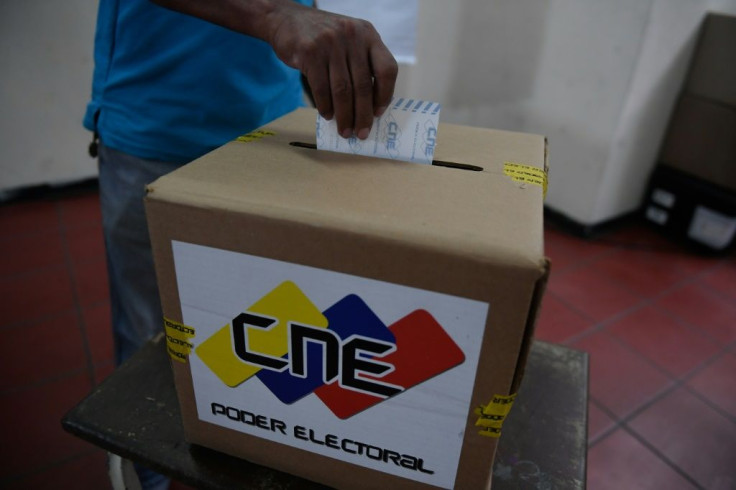Maduro Looks For 'Total Power' In Venezuela Legislative Election
Campaigning for next month's parliamentary election begins in Venezuela on Tuesday with President Nicolas Maduro looking to take back control of the National Assembly, whose speaker and opposition leader Juan Guaido is demanding a boycott.
Guaido has already denounced the December 6 election as a "fraud" while the United States, European Union and Organization of American States (OAS) have all voiced their concerns.
The opposition leader's main gripe is that Venezuela's regime-loyalist Supreme Court appointed officials to the top electoral body ahead of the vote when that role should be performed by parliament.
The National Assembly is the only government branch in opposition hands, but it has been left impotent since 2017 when the Supreme Court declared it in contempt and subsequently annulled its every decision.
Nevertheless, Maduro is desperate to reclaim control of it.
"Here we don't elect Donald Trump, (Jair) Bolsonaro or (Ivan) Duque," socialist Maduro said on Sunday, alluding to the right-wing leaders of the US, Brazil and Colombia.
Maduro is no stranger to being accused of fraud over an election. The opposition rejected his 2018 re-election and declared him a "usurper."
That led to Guaido proclaiming himself acting president in January 2019 in a direct challenge to Maduro's authority -- a move that quickly garnered support from about 60 countries.
But "Maduro doesn't seem to care much about legitimacy," Michael Shifter, president of the Inter-American Dialogue think tank, told AFP.
Taking back control of the legislature would allow him to "consolidate a hegemonic authoritarian regime, with Guaido no longer as a relevant player."
The planned boycott by Guaido and other main opposition parties leaves the way open for Maduro's United Socialist Party of Venezuela (PSUV) to win a parliamentary majority.
In an attempt to minimize the impact of the boycott, the National Electoral Council announced that more than 14,000 candidates representing 107 parties are standing for the 277 seats.
But the list even includes Guaido's Popular Will party amongst others to have announced they would boycott the vote.
Maduro "is entrenched, protected by force and the powers he controls," political scientist Luis Salamanca told AFP, referring to support the president receives from the armed forces.

Luis Vicente Leon, director at pollsters Datanalisis, believes there will be high levels of abstention among the 20.7 million voters in the country of 30 million.
But "the unresolved problem is what to do after abstaining," added Leon, who said on Twitter that the chance of an opposition boycott leading to political change "is not very promising."
Despite almost two years of pressure from Guaido and increasing sanctions against government figures and the state oil company PDVSA, Maduro has held onto power.
Guaido, whose popularity has fallen dramatically since his bold move in January 2019, says he will hold his own vote between December 5-12 without the electoral council, although he hasn't said how.
His vote would ask Venezuelans whether or not they would support "all national and international pressure mechanisms" to ensure "free presidential and parliamentary elections" and whether they reject the December 6 vote.
Guaido's intention is that if the legislative election is invalidated then the current make-up of the National Assembly, with its opposition majority, would remain in place.
But Salamanca doubts this will maintain allow Guaido to retain his influence.
"He needs to offer other initiatives to stay afloat. I don't think the poll will help."
A similar move in 2017 saw the opposition claim to have gathered 7.6 million votes in rejection of the Constituent Assembly -- a body made up entirely of regime loyalists that was effectively created to replace the legitimate parliament's functions.
But "today, Venezuelans are disillusioned with Guaido because he failed to deliver on his promise of regime change," said Shifter.
"Expectations of a political transition under his leadership are very low."
What's more, "Guido will lose formal legitimacy as president of the National Assembly in January, when Maduro consolidates total power."
It will also leave those governments that backed Guaido with "a very tricky and complicated problem."
They "will not want to abandon Guaido ... but may eventually be forced to recalibrate, depending on how the realities on the ground evolve."
© Copyright AFP 2024. All rights reserved.




















